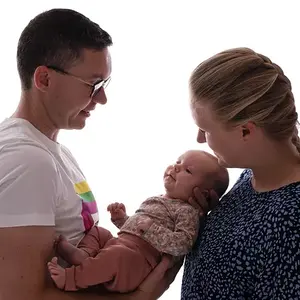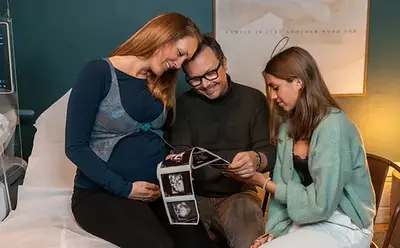DNA screening tests for both baby and parents: The best on the market
DNA screening tests for both baby and parents: The best on the market
DNA screening provides a wealth of valuable information about you, your partner, and your beautiful unborn child, that can prove vital for making informed life decisions.
At our clinic, we proudly offer the best of DNA screening the market has to offer, including the following four for your little one: Harmony, Panorama and Evita.
All our tests are Non-Invasive Pregnancy Tests (NIPT). They are completely safe as they are done through blood sample. The purpose of these tests is to examine your baby’s chromosomes and determine how he or she is going to grow and develop.
For parents, we offer the Horizon test, which allows us to screen you and / or your partner for up to 274 chromosomal conditions.
You can learn more about chromosomal conditions in general and why we screen for them on this page. However, if you have any questions or concerns, please don’t hesitate to give us a call. As always, we are here to guide and support you.
Harmony
The Harmony test detects 99.9 percent of prenatal Down Syndrome cases.

Panorama
We recommend the Panorama test for establishing the gender of your twins

Evita
The most comprehensive DNA screening for your unborn child.


Genes4Life test for parents-to-be and future parents
Do you have a family history of chromosomal conditions? Or do you worry that you or your partner might be a carrier, increasing the likelihood of your little one being inhibited in his or her healthy development?
The Genes4Life test offers a thorough screening for parents who seek to learn more about their genetic makeup in order to make informed reproductive decisions.
Genes4Life’s technology provides comprehensive screening results for commonly screened conditions, like Cystic Fibrosis, Duchenne Muscular Dystrophy, Fragile X, Spinal Muscular Atrophy, but screen for as many as up to 430 genetic conditions…
DNA screening for babies:
Completely risk-free
The purpose of performing a genetic screening test is to investigate whether your little one is likely to be affected by chromosomal conditions, such as Down Syndrome, Edwards Syndrome, Patau Syndrome, etc.
As early as week 12 – at the nuchal translucency scan – it is possible to determine whether your little one has an increased likelihood of a chromosomal condition. However, unlike the nuchal translucency scan, a DNA screening test (NIPT test) directly examines a piece of DNA from a specific chromosome – it could be chromosome 21, for example, which would result in Down Syndrome in the case of a mutation. An extra chromosome 18 results in Edwards syndrome, and an extra chromosome 13 develops into Patau Syndrome.
Good to know about genetic disorders
Most people are carriers of at least four to six genetic conditions, but the majority carriers are healthy because the other copy of the gene compensates for the mutation.
Only when a baby inherits mutated genes from both his or her parents will the condition in question manifest, and the little one will have what is known as an autosomal recessive disorder.
This means that carrier couples are at an increased likelihood of having a baby with a genetic condition – yet most often, people are unaware of their carrier status. If both you and your partner are carriers of the same mutation, there is a 25 percent likelihood that your future children will be affected by the condition. Knowing your carrier status can help you and your partner make more informed reproductive decisions.
As a woman, you can also be the carrier of a sex-linked disorder, also known as an X-linked condition, in which case one of the two X-chromosomes is mutated. As boys don’t have an extra X-chromosome to compensate for this mutation, they are the ones who will be affected.
Examination for X-linked conditions is thus available to women only.
Did you know?
Every human being has 23 pairs of chromosomes in each cell nucleus, containing a genetic copy from our mother and father, respectively. Each pair is encoded with specific information – our DNA – which tells the story of what goes on in our bodies, and how we grow and develop. -And if, for instance, we have an increased likelihood of developing a genetic condition.



